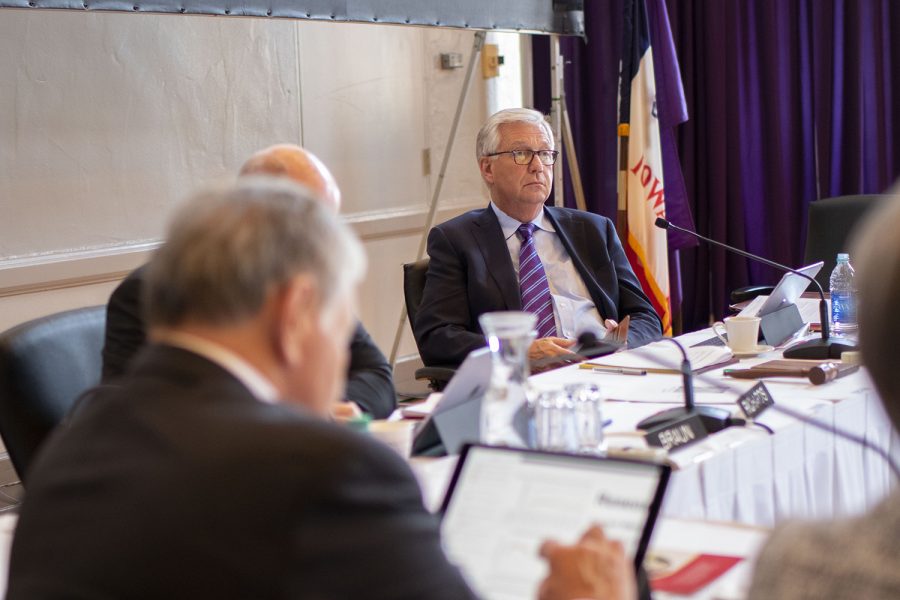Iowa regents recommend no tuition hikes amid ‘unprecedented’ COVID-19 uncertainty
The state Board of Regents’ recommendation not to increase tuition comes as the public university presidents report a financial toll on their institutions of around $200 million.
Regent President Mike Richards listens during the state Board of Regents meeting at the University of Northern Iowa in Cedar Falls on Friday, November 15, 2018.
April 30, 2020
May 4: The state Board of Regents did a first reading of the proposed tuition and mandatory fees for the 2020-21 academic year, the proposed rates will remain flat amid the novel coronavirus pandemic and the financial uncertainty that has resulted.
A final reading and vote on the tuition and fees for the three regent universities will be done during a June 4 meeting.
ORIGINAL STORY
The state Board of Regents on Thursday unveiled a plan recommending no hikes in tuition and fees for the 2020-21 academic year amid spread of the novel coronavirus and the resulting financial uncertainty, straying from the annual increases outlined in its multiyear tuition model.
The proposal comes after Iowa’s three public university presidents on Thursday reported a financial toll on their institutions of around $200 million from responding to the spread of COVID-19. As they project enrollment declines particularly from new first-year and international students, holding tuition rates steady would mean a decline in tuition revenue.
However, the tuition proposal states the governing board may re-evaluate tuition rates for the spring 2021 semester in the fall “as more information becomes available.”
A first reading of the proposed tuition rates will take place during a virtual meeting May 4. The regents vote on the rates at their June 4 meeting.
“The COVID-19 epidemic is unprecedented. Like every other facet of society, our public universities have undergone massive disruptions, which affect all of our students, faculty and staff,” regents documents stated. “… It is important that our students, families and our institutions have as much financial predictability as possible. Therefore, it is recommended there be no increases in tuition rates or mandatory fees.”
RELATED: University of Iowa president reports around $76 million in expenses, losses from COVID-19 response
The multiyear tuition model was created to keep tuition-rate increases consistent and regent universities competitive with their peer institutions while providing students and families with predictability in planning their finances. The model outlines a range of base tuition increases that factor in the level of state funding provided in a given budget year amid the trend University of Iowa officials call “generational disinvestment” in public higher education.
Under the model, resident undergraduate tuition rates increase by 3 percent per year if state appropriation requests are funded. If the state does not provide any additional funding, tuition increases by 3 percent plus Higher Education Price Index.
The 2019-20 academic year was the first year of the model, and resident undergraduate students at the UI and ISU saw a 3.9 percent tuition increase, while nonresident undergraduates saw a 1 percent increase.
Both universities are ranked low in their peer groups when it comes to tuition rates for resident and nonresident students, according to regent documents.




